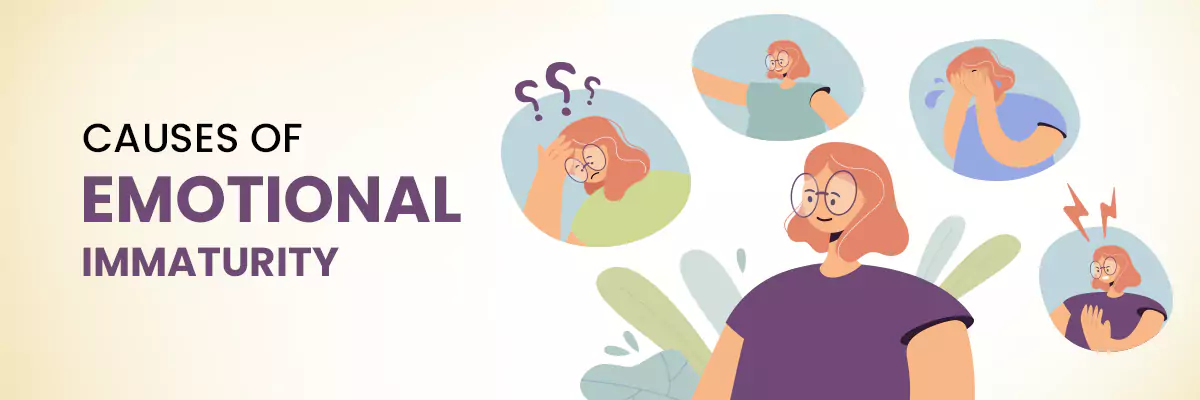We all dream of finding the perfect life partner—a companion with whom we can enjoy every moment, someone attuned to our feelings and desires. A partner who fulfills our wishes even before we express them; someone romantic, caring, and loving. However, what if the person you marry turns out to be emotionally immature? Who consistently shows signs of an emotionally immature partner at every stage of life.
Understanding Emotional Immaturity in Relationships
Emotional immaturity in relationships means that someone might not be very good at understanding and dealing with their own feelings, and they might have trouble responding well to their partner’s emotions. This can cause problems in how the relationship works and how both people feel. Additionally, an emotionally immature partner may struggle with controlling their emotions, shying away from responsibility for their actions. They might also struggle with communicating effectively and handling conflicts in a healthy way. In a nutshell, it’s like not being very good at handling emotions and it can make relationships more difficult.
Signs of an Emotionally Immature Partner
Some common characteristics of emotional immaturity in relationships include:
1. Lack of Self-Awareness
Emotionally immature individuals may struggle to recognise and understand their own emotions. They may be unaware of how their feelings influence their thoughts and behaviours. Seeking constant validation from others, rather than having a secure sense of self-worth, is a common trait of emotional immaturity.
Moreover, people with emotional immaturity may find it challenging to express their emotions in a constructive and clear manner. This can lead to misunderstandings and communication breakdowns in a relationship.
2. Avoidance of Responsibility
Emotional immaturity often manifests in an unwillingness to take responsibility for one’s own actions and emotions. Instead, individuals may blame others or external circumstances for their problems. Additionally, emotionally immature individuals may rely heavily on their partners for emotional support, validation, and decision-making. This dependency can strain the relationship and create an unhealthy power dynamic.
3. Impulsivity
Emotional immaturity can be associated with impulsive behavior, where individuals act without considering the consequences. This impulsivity can lead to poor decision-making and erratic behavior in relationships. Moreover, people with emotional immaturity may avoid or mishandle conflicts in relationships. They might resort to passive-aggressive behavior, avoidance, or explosive outbursts rather than engaging in open and constructive communication.
4. Fear of Intimacy
Emotional immaturity can contribute to a fear of intimacy or commitment. Individuals may struggle with vulnerability and have difficulty forming deep emotional connections with their partners. Additionally, an emotionally immature partner may struggle to empathize with their significant other’s feelings and perspectives, making it challenging to build a supportive and understanding connection.
5. Inconsistent Behavior
Emotional immaturity may be characterized by inconsistency in behavior and emotions. Partners may find it challenging to predict how the emotionally immature individual will react in different situations.
Causes of Emotional Immaturity

If your partner is emotionally immature and you don’t feel connected, it can strain the relationship. Communication might be tough, and you may feel isolated. Hence, emotional immaturity can arise from a combination of various factors, and its origins are often complex. Here are some potential causes or contributing factors:
Childhood Experiences
Growing up in difficult situations, like facing abuse, neglect, or inconsistent care, can affect how emotions develop. If there’s not enough emotional support during the early years, it might lead to emotional immaturity in adulthood. This can play a role in having an emotionally immature partner later in life.
Unhealthy Parental Modeling
Children often learn emotional regulation and interpersonal skills by observing their parents. If a person grows up in an environment where caregivers demonstrate emotional immaturity or struggle with effective communication, the individual may adopt similar patterns.
Genetic Factors
Some scientists think that problems with handling emotions could have a connection to our genes. While genes alone don’t decide how emotionally mature someone is, they might make a person more likely to face certain emotional difficulties. This means that a person’s genetic makeup could play a part in why they struggle with emotional maturity.
This understanding is important, especially when dealing with a relationship involving an emotionally immature partner. It suggests that their challenges in handling emotions might be influenced, at least in part, by their genes, making it tougher for them to navigate their feelings in a relationship.
Social and Cultural Factors
Cultural norms and societal expectations can shape emotional expression and regulation. Growing up in an environment that discourages emotional expression or values emotional suppression may contribute to emotional immaturity.
Developmental Delays
Some individuals may experience delays in emotional development, affecting their ability to understand and manage emotions appropriately. This can be influenced by factors such as neurological differences or learning disabilities.
Lack of Emotional Education
Not everyone gets the right guidance or education about emotions, which can lead to a lack of emotional intelligence and regulation. When people don’t understand their feelings well, it can make them emotionally immature. This lack of awareness might affect how they handle relationships.
For example, an emotionally immature partner may struggle with expressing and managing their emotions, making it challenging for them to navigate the ups and downs of a relationship. In such cases, learning more about emotions and finding ways to improve emotional intelligence can be important for personal and relational growth.
Trauma and Stress
Going through tough times or stress can mess with your emotions. How you deal with it can make you emotionally immature, especially if your coping strategies aren’t great. This can be a big deal especially for an immature woman or wife, as it affects how emotionally mature, she is.
Personality Factors
Some personality traits, like impulsivity or a fear of vulnerability, can contribute to emotional immaturity. These characteristics may pose challenges for individuals, especially if they exhibit them as immature husbands, impacting their ability to navigate relationships effectively.
How to deal with an emotionally immature partner?
In relationships, emotional maturity holds significant importance, particularly when your partner initially exhibits signs of emotional immaturity. However, it’s essential to offer understanding and create a supportive environment to facilitate their growth and healing. Additionally, providing space for them to enhance their emotional well-being can contribute to building a healthier and more resilient connection.
Consider these guidelines when managing a relationship with an emotionally immature partner:
- Talk openly and calmly about your feelings and concerns. Reassuring them that it’s okay and you’re there with them through the process.
- Set clear expectations for behavior and communicate consequences for crossing boundaries. Let them know that their immature behavior not only affects others but is also harmful to themselves.
- Encourage your partner to grow personally by gently suggesting and supporting their self-awareness journey.
- Show emotional maturity through your own actions.
- Be patient with your partner’s personal growth—it takes time.
- Evaluate how the relationship affects your emotional needs and goals.
- Consider seeking professional guidance for positive changes in the relationship.
Concluding the conversation with a query:
What advice would you offer to a spouse dealing with an emotionally immature life partner?
Feel free to share your thoughts in the comments section. Looking forward to hearing from you!


You shed light on an unnoticed topic. Mostly People believe marriage can mature a person emotionally, but its not true.
One of my cousin went through a tough time with her emotionally immature partner, leading to their divorce.
Parents! This blog is a must-read for you! 🙏
Keep writing on such topics. 👍
اسلام علیکم
Hi how are you
I’m Samiullah
And my age 19
I’m Pakistani
Need rishta
رشتے کے لئے ویب سائٹ پر دئیے گئے “رجسٹر” کے بٹن پر کلک کریں۔۔ رجسٹر کرتے ہی ای میل آئے گی۔ اسے ویریفائی کریں۔ اور اس کے بعد لاگن کر کے پروفائل بنائیں۔ پروفائل مکمل ہوتے ہی آپ کو رشتے نظر آ جائیں گے۔ ان میں کسی سے بھی رابطہ کر سکتے ہیں۔
I appreciated how the author not only identified the signs but also provided practical solutions. The explanations were clear and easy to understand, prompting me to reflect on the experiences of someone close to me. My cousin faced similar challenges with an emotionally immature partner, and it made her life incredibly difficult despite her sensible, educated, and decent nature. Your writing on this topic resonates deeply. Looking forward to more posts like this in the future!
Good Blog.